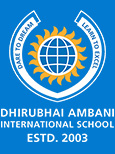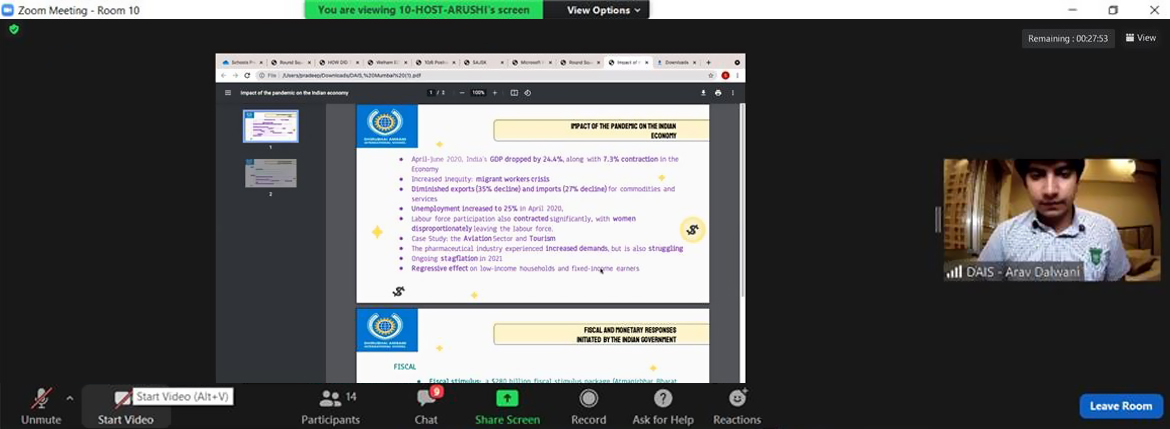Dynamics of World Economics in 2020

With the advent of the corona virus, the mechanism of world economy changed dramatically. Genesis Global School from Delhi, India hosted a 90-minute Round Square postcard titled ‘Dynamics of World Economics in 2020’. Here, we discussed the changes the world has undergone in the past 17 months, along with the policies implemented to battle them, particular to our countries of residence. We aimed to discuss the differences in the policies with respect to the countries, followed by analysing, evaluating, and debating them. The participants were students aged 16 to 18 from countries, such as India, United States of America, Colombia, United Arab Emirates, Japan, etc. Representing Dhirubhai Ambani International School were students from Grade 11 and 12.
Research and Presentation:

As a pre task, all participant schools were to prepare a two-slide presentation on the impact of COVID-19 on their country’s economy and the consequential policies taken by the government. This presentation was an opportunity to utilise our research skills and we were able to gain practical insight into the nuances of fiscal and monetary policies. The research undertaken for the conference helped us understand the wide extent of industries and stakeholders the pandemic had an impact on. Learning about the responses of different governments to minimize the adverse effect of the pandemic stimulated us to evaluate the efficacy of the policies implemented by the Indian government and the rest of the world.
Opening Ceremony

During the opening ceremony, Ms. Malini Sharma gave an extremely informative and analytical speech on the impact of the pandemic on the global economy, describing the two-fold crisis—health and economic—the supply and demand shock, the geo-political trend of de-globalisation and the measures to continue sustained economic activity. She also described the boost in online trade, shift away from global supply chains, and impact on the labour force participation rate of women due to the COVID-19 crisis.
Baraza group:
In the Baraza groups, we began with a short ice-breaker session to get to know the others and our Baraza leader much better. We, then, moved onto in-depth discussions of how the governments responded to the downturn caused by the pandemic, where each participant presented their research.

Presenting and discussing the policies with citizens of countries from Colombia to the United States allowed us to see the real-world impact of these policies, not just its academic evaluations, and gain perspective. Moreover, there was interesting debate about the correct approach to dealing with a recession, whether using fiscal, monetary or supply-side policies was the better choice, and how governments should effectively implement them.
We also concurrently discussed the different ways in which the pandemic impacted people from different sections of society; the discussion ended with all of us talking about whether or not nations should invest more heavily in stabilizing their economy, or prioritizing human welfare (imposition of lockdowns, etc).
In conclusion, the Round Square postcard was a unique opportunity of exposure to different students, cultures, and, hence, points of view on the economic impacts of and policies for the COVID-19 pandemic – the most significant world event of our lifetime.
Reflections:
“The conference provided an interesting window to explore the practical reality of the policies we learn about in class.” - Sidharth Wagle
“This was an extremely productive experience that provided me with different insights from a diverse group of students” - Mira Dasgupta
“The conference helped me widen my perspective on different nations’ economies and introduced me to many new individuals from across the world.” - Ahaan Jindal
Delegates:
Ahaan Jindal, Sidharth Wagle, Vivaan Singh, Manthan Rao, Arav Dalwani, Mira Dasgupta
Accompanying Teacher:
Ms Rashmi Baruah

